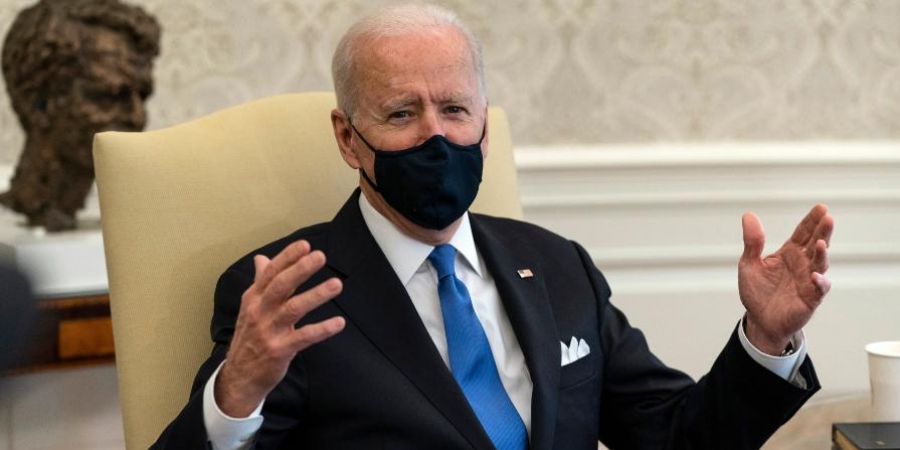 WASHINGTON: US President Joe Biden has invited 40 world leaders, including Prime Minister Narendra Modi, to a US-hosted virtual summit on climate next month to underscore the urgency and the economic benefits of stronger climate action, the White House said.
WASHINGTON: US President Joe Biden has invited 40 world leaders, including Prime Minister Narendra Modi, to a US-hosted virtual summit on climate next month to underscore the urgency and the economic benefits of stronger climate action, the White House said.
Biden will host a two-day climate summit of world leaders starting on Earth Day, April 22, in which he will outline the US goal for reductions of carbon emissions by 2030 — known as the nationally determined contribution under the historic Paris accord.
The White House on Friday said a total of 40 world leaders, including Prime Minister Modi, Chinese President Xi Jinping and Russian President Vladimir Putin, were invited to the conference, which will be live streamed to the public.
“It will be a key milestone on the road to the United Nations Climate Change Conference (COP26) this November in Glasgow,” it said.
Other leaders invited for the summit include Japanese Prime Minister Yoshihide Suga, Brazilian President Jair Bolsonaro, Canadian Prime Minister Justin Trudeau, Israeli Prime Minister Benjamin Netanyahu, Saudi Arabia King Salman bin Abdulaziz Al Saud and UK Prime Minister Boris Johnson.
Bangladeshi Prime Minister Sheikh Hasina and Bhutanese Prime Minister Lotay Tshering are the other two leaders from South Asia to be invited for the mega-conference.
The White House said a key objective of both the Leaders’ Summit and the COP26 will be to catalyse efforts to keep limiting warming 1.5 degree Celsius’ goal within reach.
The summit will also highlight examples of how enhanced climate ambition will create good paying jobs, advance innovative technologies and help vulnerable countries adapt to climate impacts, it added.
By the time of the summit, the United States will announce an ambitious 2030 emissions target as its new Nationally Determined Contribution under the Paris Agreement, the White House said.
In his invitation, Biden urged leaders to use the summit as an opportunity to outline how their countries also will contribute to stronger climate ambition, it said.
The summit will reconvene the US-led Major Economies Forum on Energy and Climate, which brings together 17 countries responsible for approximately 80 per cent of global emissions and global GDP.
Biden also invited the heads of other countries that are demonstrating strong climate leadership, are especially vulnerable to climate impacts, or are charting innovative pathways to a net-zero economy.
A small number of business and civil society leaders will also participate in the summit, the White House said.
On the campaign trail, Biden made climate change a central issue, setting a goal of ensuring that the US achieves net-zero emissions by 2050.
He has signed several executive actions his first week in office related to the climate crisis, including one directing the secretary of the Interior to pause on entering into new oil and natural gas leases on public lands or offshore waters.
Key themes of the summit will include galvanising efforts by the world’s major economies to reduce emissions during this critical decade to keep a limit to warming of 1.5 degree Celsius within reach and mobilising public and private sector finance to drive the net-zero transition and to help vulnerable countries cope with climate impacts, it said.
The summit will also look into the economic benefits of climate action, with a strong emphasis on job creation, and the importance of ensuring all communities and workers benefit from the transition to a new clean energy economy.
It will also look for ways to spurring transformational technologies that can help reduce emissions and adapt to climate change, while also creating enormous new economic opportunities and building the industries of the future, the White House said.
Among other key issues include showcasing sub-national and non-state actors that are committed to green recovery and an equitable vision for limiting warming to 1.5 degrees Celsius, and are working closely with national governments to advance ambition and resilience, it said.
The summit will also discuss opportunities to strengthen capacity to protect lives and livelihoods from the impacts of climate change, address the global security challenges posed by climate change and the impact on readiness, and address the role of nature-based solutions in achieving net-zero by 2050 goals, the White House said.
Recent Random Post:

















